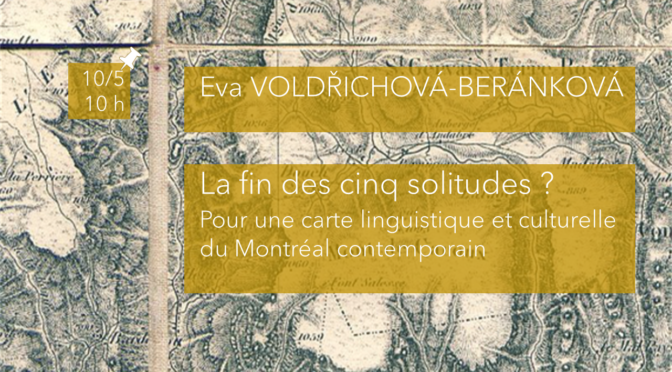
The End of the Five Solitudes? Towards a Linguistic and Cultural Map of Contemporary Montreal
Sixth session of the 2023-2024 CEFRES Francophone Interdisciplinary Seminar The map and the border
In 2023, we would like to start by beginning by questionning the very act of bordering and representing (a territory, a period, a trajectory), in short, thanks to the interdisciplinarity of our respective disciplines, to question the map and the border.
Location: CEFRES, Na Florenci 3, Prague 1
Date: Friday 10th, May 2024 from 10am to 12pm CET
Language: French
Speaker: Eva Voldřichová-Beránková (Faculty of Arts, Charles University)
Discussant: Mateusz Chmurski (CEFRES)
Abstract
In 1945, Hugh MacLennan’s renowned novel Two Solitudes explored the cultural alienation between Quebec’s French-speaking and English-speaking populations. Over three centuries, language, religion and socioeconomic factors have traditionally acte as barriers between these communities, fostering coexistence rather than integration. Since the 1980s, a revived academic interest in Montreal’s Yiddish culture had led to discussions of a “third solitude” characterizing certain Jewish diasporas in Canada. Simultaneously, a cultural and political renaissance among First Nations and Inuit peoples has been decribes as the “fourth solitude”, reflecting their unique life experiences. Today, authors of migrant literatures frequently evoke a “fifth solitude”, encompassing immigrants, their descendants, and native Quebecers who explore themes of exile and cultural adaptation. Montreal emerges as a historical nexus of these “five solitudes”, each shaping the city’s landcape and narrative. By examining specific neighborhouds, insights can be gained into how diverse linguistic and cultural communities have become ingrained in Montreal’s urban fabric, expanding across space and time. Through their literary contributions, they offer distinctive perspectives on the Canadian metropolis, contributing to its intricate linguistic, cultural and mental map. As Prime Minister Justin Trudeau commits to addressing the “trauma of historical solitudes”, consideration is given to the practical tools available to realize this aspiration.
View the complete seminar program for 2023-2024 here.
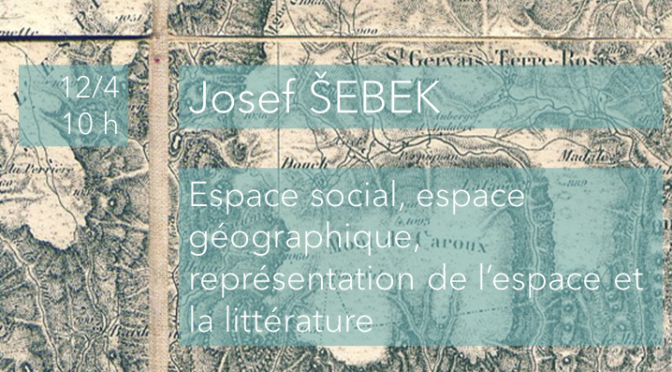
Social space, geographical space, representation of space and literature
Fifth session of the 2023-2024 CEFRES Francophone Interdisciplinary Seminar The map and the border
In 2023, we would like to start by beginning by questionning the very act of bordering and representing (a territory, a period, a trajectory), in short, thanks to the interdisciplinarity of our respective disciplines, to question the map and the border.
Location: CEFRES Library, Na Florenci 3, Prague 1
Dates: Friday, April 12th, 10–11:30 am
Language: French
Speaker : Josef Šebek, Department of Czech and Comparative Literature, Faculty of Arts, Charles University, associate researcher at CEFRES
Discussant: Yasar ABU GHOSH (FHS UK)
The talk will focus on the forms of space in Pierre Bourdieu’s field theory, looking in particular at the way they relate to one another and at the spatial aspects of the literary field. The first of these forms is the social space and social field, referring to a structure of positions that exists objectively yet does not exist (primarily) in physical space or real (physical) interactions between social agents. In order to make this structure intelligible, Bourdieu creates various spatial schemata that range from simple diagrams to visualisations based on multiple correspondence analysis. His followers come with even more sophisticated representations of social space. The relationship between this structure and geographical/physical space is complicated since relations in the social space or social fields do not necessarily coincide with actual spatial distances and proximities. Nevertheless, Bourdieu demonstrates – especially in the last period of his career – that it is necessary to study the relations among agents and the objectified forms of capital as they play out within physical/geographical space… The talk will then move to the question how the relations of the three forms of space can be applied to the literary field. In the spatially most interesting part of The Rules of Art, the “Prologue”, the representation of space has the competing forms of a diagram and a map. Bourdieu’s thinking on space thus guides us through the intriguing problem how to actually map literary fields as well as the social and geographical space represented in literary works.
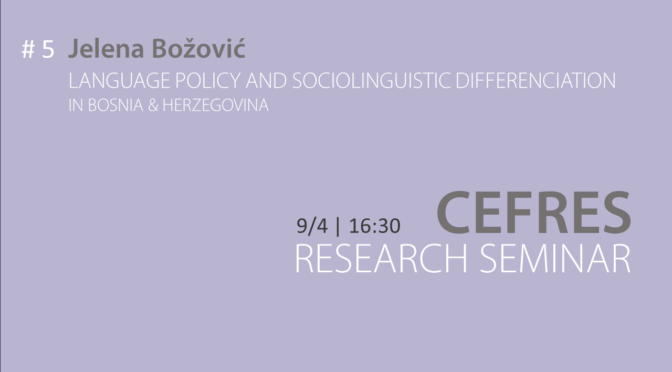
Language policy and sociolinguistic differentiation in Bosnia and Herzegovina: From (in)significant difference to language boundaries
5th session of CEFRES in-house seminar
Through the presentation of works in progress, CEFRES’s Seminar aims at raising and discussing issues about methods, approaches or concepts, in a multidisciplinary spirit, allowing everyone to confront her or his own perspectives with the research presented.
Location: CEFRES Library
Date: Tuesday, April 9, 2024 at 4:30 pm
Language: English
Contact / To register: cefres[@]cefres.cz
Speaker
- Markéta Slavková, The Prague Security Studies Institute
Abstract
The question of language boundaries is not often addressed in language policy studies. When exploring multilingual settings, language policy scholars traditionally presuppose a plurality of languages treated as separate and fixed bounded entities. Working with easily identifiable and distinguishable linguistic units then allows for a closer study of their relationships. However, this task can be challenging in settings where languages are structurally close and overlapping, and boundaries are not always sharp and clear-cut. Here, determining the relationships between the (competing) languages and linguistic groups is not necessarily straightforward. This is because some differences are more subjected to boundary processes and some less, while some go completely unnoticed. Insights from these settings can therefore expand our understanding of language boundaries as stemming not only or not always from differences in languages’ formal aspects and their denotational, usually stable, meanings, but also as something deriving from the social and political function of language and its situated use.
In my dissertation, I am focused on Bosnia and Herzegovina, a context where a transition from one common standard language to three separate national standard languages occurred following the disintegration of Yugoslavia, inevitably raising the question of differentiation and boundaries. In fact, while examining the processes of interpretation of the official language policies during my ethnographic fieldwork in this country, it became clear that they mostly consist in interpreting differences and boundaries between these languages. Thus, my research is concentrated on language boundary processes, i.e. on how language boundaries are constructed, deconstructed, blurred, transcended or ignored altogether by social actors within various language policy settings. In this seminar, I will focus on questions of which boundaries are constructed and how, and in what ways these processes are related to questions of power relations and authority as well as their implications for the official language policy.
See the complete program of 2023–2024 seminar here.
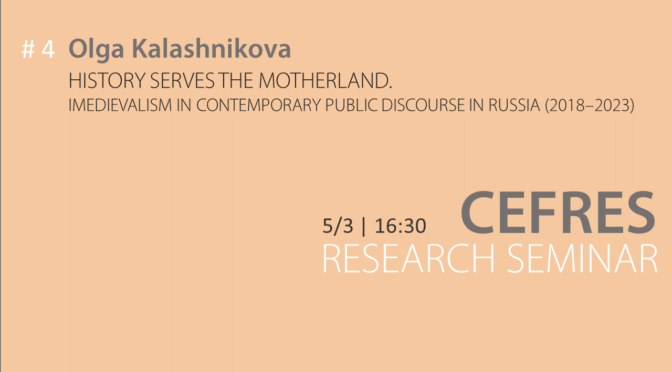
History serves the Motherland:
Medievalisms in contemporary public discourse in Russia (2018–2023)
4th session of CEFRES in-house seminar
Through the presentation of works in progress, CEFRES’s Seminar aims at raising and discussing issues about methods, approaches or concepts, in a multidisciplinary spirit, allowing everyone to confront her or his own perspectives with the research presented.
Location: CEFRES Library
Date: Tuesday, March 5, 2024 at 4:30 pm
Language: English
Contact / To register: cefres[@]cefres.cz
Discussant: Martin ŠORM, Center for Medieval Studies, FLÚ, Czech Academy of Sciences
Continue reading History serves the Motherland. Medievalisms in public discourse in Russia →
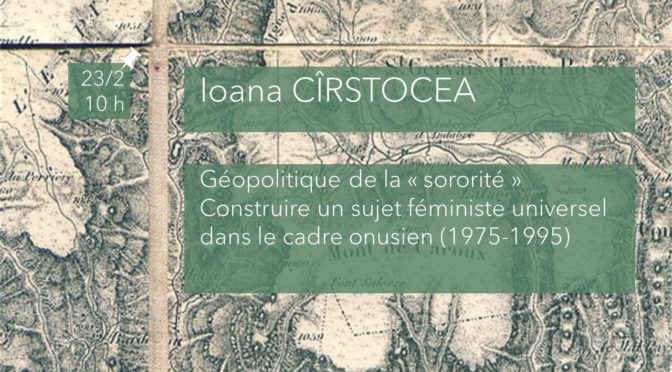
Geopolitics of sisterhood.
Framing global feminism within the UN women’s conferences (1975–1995)
Fourth session of the 2023–2024 CEFRES Francophone Interdisciplinary Seminar The map and the border
This year, we would like to start by questioning the very act of bordering and representing (a territory, a period, a trajectory), in short, through the interdisciplinarity of our perspectives, to question the map and the border.
Location: CEFRES Library, Na Florenci 3, Prague 1
Dates: Friday, February 23rd, 10–11.30 am
Language: French
Speaker: Ioana CÎRSTOCEA, CNRS / CEFRES
Discussant: Giedrė Šabasevičiūtė (Oriental Institute, Czech Academy of Sciences)
Abstract Continue reading Geopolitics of sisterhood →
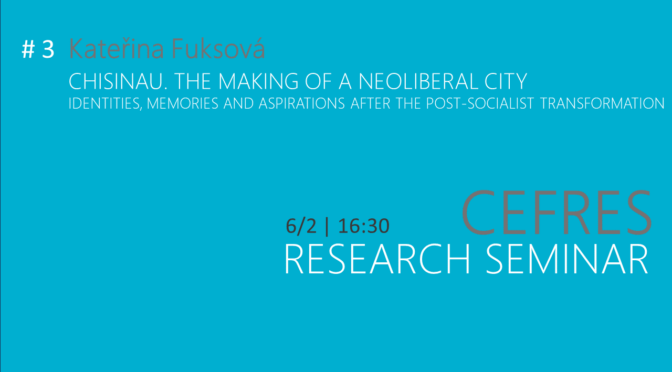
Chisinau: The Making of a Neoliberal City.
Identities, Memories and Aspirations after the post-Socialist Transformation
3rd session of CEFRES in-house seminar
Through the presentation of works in progress, CEFRES’s Seminar aims at raising and discussing issues about methods, approaches or concepts, in a multidisciplinary spirit, allowing everyone to confront her or his own perspectives with the research presented.
Location: CEFRES Library
Date: Tuesday, 6th of February, 2024
Language: English
Contact / To register: cefres[@]cefres.cz
Discussant: Valeriya Korablyova (CEFRES / Faculty of Social Sciences, Charles University)
Continue reading Chisinau: The Making of a Neoliberal City →






